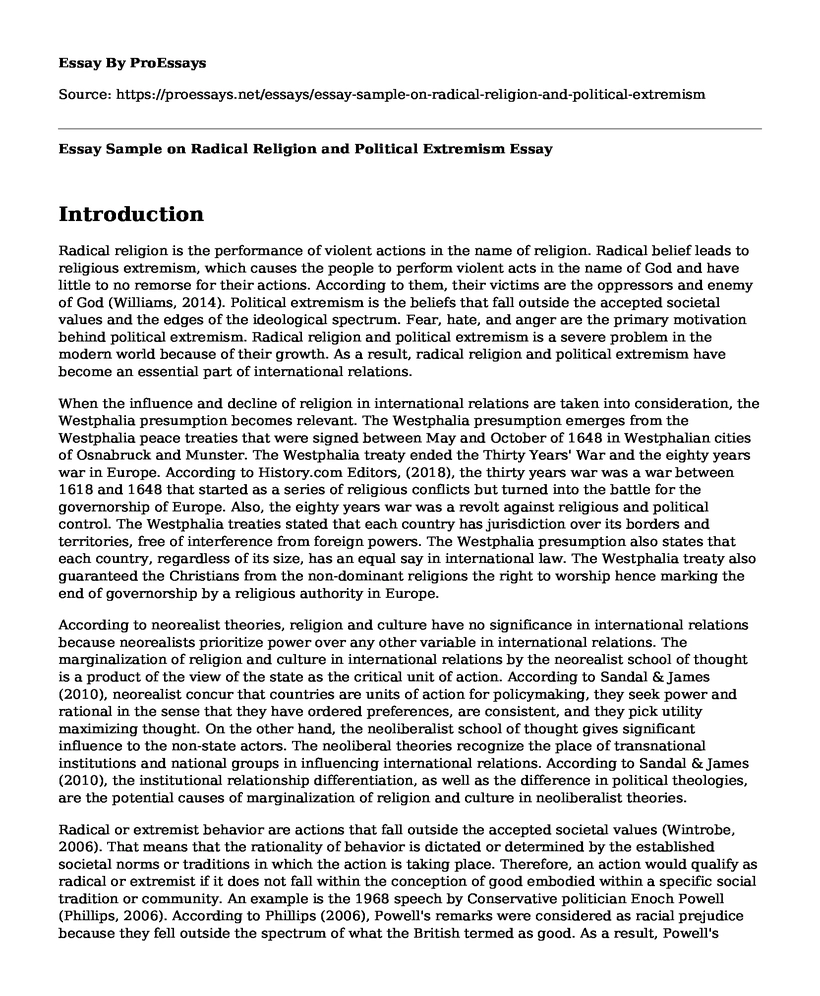Introduction
Radical religion is the performance of violent actions in the name of religion. Radical belief leads to religious extremism, which causes the people to perform violent acts in the name of God and have little to no remorse for their actions. According to them, their victims are the oppressors and enemy of God (Williams, 2014). Political extremism is the beliefs that fall outside the accepted societal values and the edges of the ideological spectrum. Fear, hate, and anger are the primary motivation behind political extremism. Radical religion and political extremism is a severe problem in the modern world because of their growth. As a result, radical religion and political extremism have become an essential part of international relations.
When the influence and decline of religion in international relations are taken into consideration, the Westphalia presumption becomes relevant. The Westphalia presumption emerges from the Westphalia peace treaties that were signed between May and October of 1648 in Westphalian cities of Osnabruck and Munster. The Westphalia treaty ended the Thirty Years' War and the eighty years war in Europe. According to History.com Editors, (2018), the thirty years war was a war between 1618 and 1648 that started as a series of religious conflicts but turned into the battle for the governorship of Europe. Also, the eighty years war was a revolt against religious and political control. The Westphalia treaties stated that each country has jurisdiction over its borders and territories, free of interference from foreign powers. The Westphalia presumption also states that each country, regardless of its size, has an equal say in international law. The Westphalia treaty also guaranteed the Christians from the non-dominant religions the right to worship hence marking the end of governorship by a religious authority in Europe.
According to neorealist theories, religion and culture have no significance in international relations because neorealists prioritize power over any other variable in international relations. The marginalization of religion and culture in international relations by the neorealist school of thought is a product of the view of the state as the critical unit of action. According to Sandal & James (2010), neorealist concur that countries are units of action for policymaking, they seek power and rational in the sense that they have ordered preferences, are consistent, and they pick utility maximizing thought. On the other hand, the neoliberalist school of thought gives significant influence to the non-state actors. The neoliberal theories recognize the place of transnational institutions and national groups in influencing international relations. According to Sandal & James (2010), the institutional relationship differentiation, as well as the difference in political theologies, are the potential causes of marginalization of religion and culture in neoliberalist theories.
Radical or extremist behavior are actions that fall outside the accepted societal values (Wintrobe, 2006). That means that the rationality of behavior is dictated or determined by the established societal norms or traditions in which the action is taking place. Therefore, an action would qualify as radical or extremist if it does not fall within the conception of good embodied within a specific social tradition or community. An example is the 1968 speech by Conservative politician Enoch Powell (Phillips, 2006). According to Phillips (2006), Powell's remarks were considered as racial prejudice because they fell outside the spectrum of what the British termed as good. As a result, Powell's ideologies were deemed to be political extremism.
References
History.com Editors. (2018, August 21). Thirty Years War. Retrieved from History: https://www.history.com/topics/reformation/thirty-years-war
Phillips, M. (2006). Londonistan. New York: Encounter Books.
Sandal, N., & James, P. (2010, July 23). Religion and International Relations theory: Towards a mutual understanding. European Journal of International Relations, 17(1), 3-25. doi:10.1177/1354066110364304
Williams, Z. (2014, June 27). The radicalisation of Samantha Lewthwaite, the Aylesbury schoolgirl who became 'the white widow.' Retrieved from The Guardian: https://www.theguardian.com/uk-news/2014/jun/27/what-radicalised-samantha-lewthwaite-77-london-bombings
Wintrobe, R. (2006). Rational Extremism. New York: Cambridge University Press.
Cite this page
Essay Sample on Radical Religion and Political Extremism. (2022, Dec 18). Retrieved from https://proessays.net/essays/essay-sample-on-radical-religion-and-political-extremism
If you are the original author of this essay and no longer wish to have it published on the ProEssays website, please click below to request its removal:
- Jihad Concept and Five Pillars of Islam
- Response to McCloskey's on Being an Atheist Essay
- Paper Example on Catholic Epistles
- Jericho Bible Story Essay Prompts
- Is There Existence of God?
- Article Analysis Essay on Spirituality in Nursing
- Modernity: Integrating New Metaphysics, Theology Into Christianity - Essay Sample







